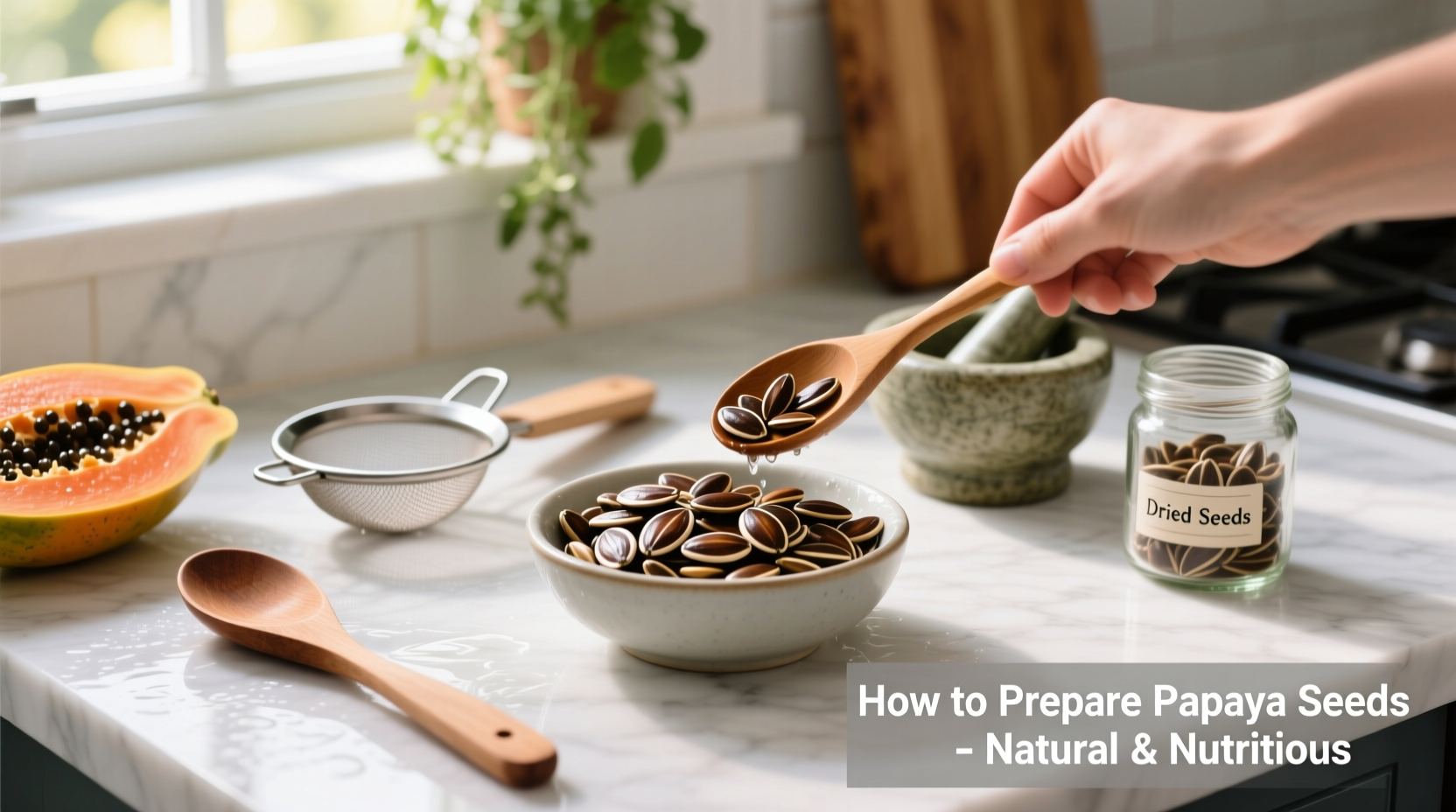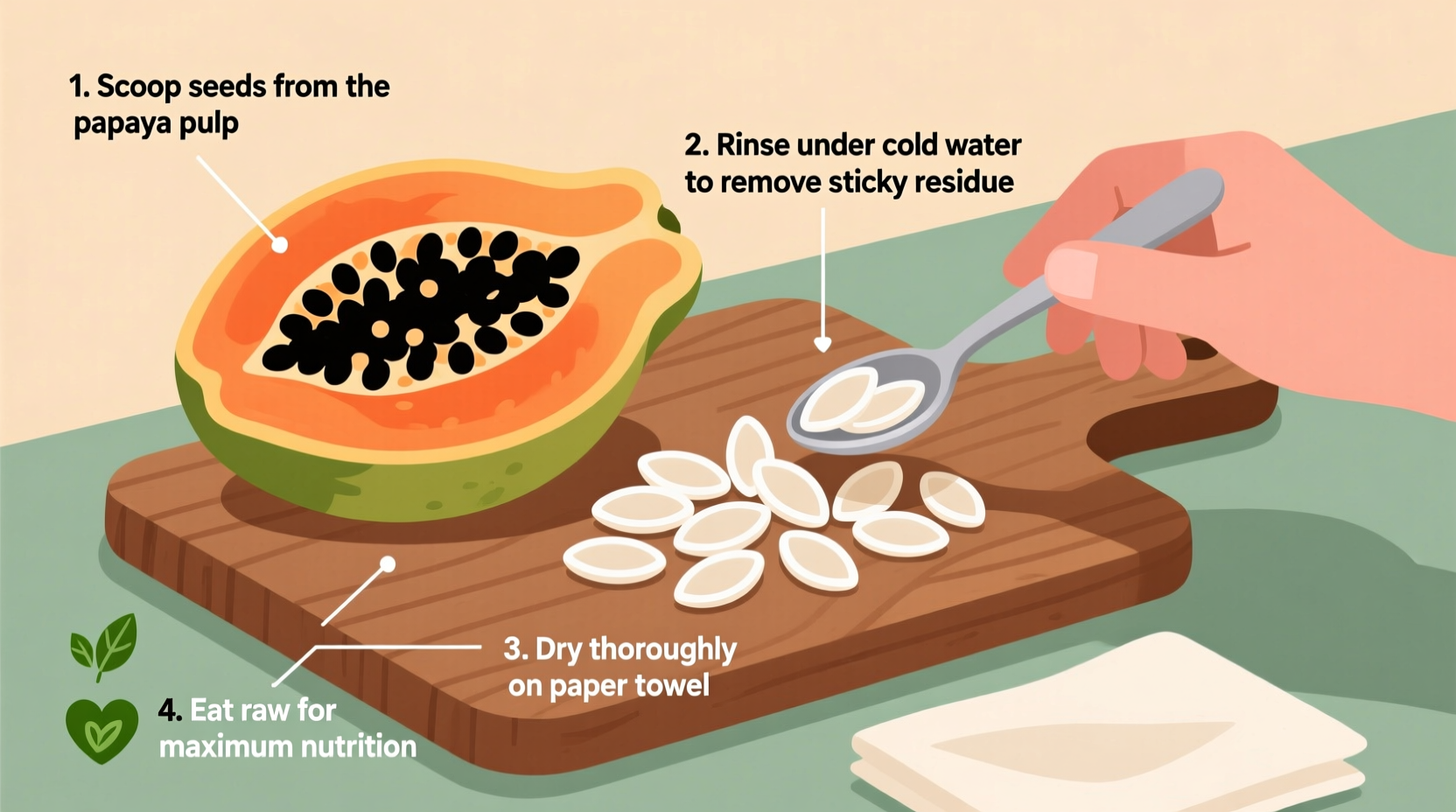Curious about how to eat papaya seeds but unsure where to start? You're not alone. Many health-conscious eaters discover these tiny black seeds while preparing fresh papaya and wonder if they're safe to consume. The good news is papaya seeds offer surprising nutritional benefits when prepared correctly, but they require proper handling to avoid potential side effects.
Why Papaya Seeds Deserve Your Attention
Most people toss papaya seeds without realizing they contain valuable nutrients. These peppery-flavored seeds provide:
- Protein (about 31% by weight)
- Healthy monounsaturated fats including oleic acid
- Papain enzyme for improved digestion
- Phenolic compounds with antioxidant properties
- Calcium, magnesium, and potassium
Unlike many trendy superfoods, papaya seeds have been used traditionally across tropical regions for centuries. Modern research published in the Journal of Ethnopharmacology confirms their traditional medicinal applications while highlighting important consumption guidelines.
Step-by-Step Preparation Process
Before you can enjoy papaya seeds, proper preparation ensures optimal flavor and safety:
| Preparation Stage | Time Required | Key Tips |
|---|---|---|
| Harvesting | 5 minutes | Scoop seeds from ripe papaya, separate from membrane |
| Cleaning | 10 minutes | Rinse thoroughly under cold water, remove stringy fibers |
| Drying | 24-48 hours | Air dry on parchment paper or use dehydrator at 115°F |
| Storage | Instant | Keep in airtight container away from light for up to 3 months |
5 Practical Ways to Incorporate Papaya Seeds
1. Raw Consumption (Simplest Method)
Chew 5-10 cleaned seeds after meals to aid digestion. Start with just 3-5 seeds daily to assess tolerance. The peppery flavor works well after protein-rich meals. According to research from the University of São Paulo, this traditional practice helps break down proteins more efficiently.
2. As a Pepper Alternative
Dry seeds thoroughly, then grind in a spice grinder. Substitute for black pepper in salad dressings, marinades, or roasted vegetables. The flavor profile differs slightly—more earthy with subtle bitterness—so adjust recipes accordingly.

3. Smoothie Booster
Add 1 teaspoon of cleaned seeds to your morning smoothie. The strong flavors of banana, pineapple, or citrus help mask the bitterness. This method delivers digestive enzymes while providing sustained energy throughout your morning.
4. Salad Topper
Lightly toast cleaned seeds in a dry pan for 2-3 minutes until fragrant. Sprinkle over green salads or grain bowls. The crunch adds texture while the enzymes help digest raw vegetables more effectively.
5. Papaya Seed Oil Extraction
For advanced users: Cold-press dried seeds to create nutrient-rich oil. While time-consuming, this method preserves heat-sensitive compounds. Use the oil in dressings or as a finishing oil—never for high-heat cooking.
Health Benefits: Traditional Claims vs. Scientific Evidence
Many cultures have used papaya seeds medicinally, but not all claims hold up to scientific scrutiny:
| Traditional Claim | Scientific Support | Recommended Approach |
|---|---|---|
| Parasite elimination | Moderate (in vitro studies) | Consult doctor for parasitic infections; seeds may complement treatment |
| Improved digestion | Strong (multiple clinical studies) | Consume 5-10 seeds after meals for best results |
| Liver detoxification | Limited (animal studies only) | Include as part of balanced diet, not standalone treatment |
| Antibacterial properties | Emerging (test tube research) | Promising but requires more human studies |
Safety Considerations and Limitations
Papaya seeds offer benefits but come with important limitations:
- Pregnancy warning: Avoid completely during pregnancy due to potential uterine stimulation effects documented in Phytotherapy Research
- Daily limit: Maximum 1-2 teaspoons (about 10-20g) for adults
- Children: Not recommended for children under 12
- Medication interactions: May affect blood thinners; consult your physician
- Quality matters: Choose organic papaya when possible to avoid pesticide residues concentrated in seeds
Start with small amounts to assess tolerance. Some people experience mild digestive upset when first introducing papaya seeds. If you notice any adverse reactions, discontinue use immediately.
Maximizing Nutritional Benefits
For optimal results when learning how to eat papaya seeds properly:
- Consume with vitamin C-rich foods to enhance nutrient absorption
- Pair with healthy fats (like avocado) to improve absorption of fat-soluble compounds
- Use within 3 months of harvesting for maximum enzyme activity
- Never heat above 118°F (48°C) to preserve enzymatic properties
- Combine with probiotic foods for enhanced digestive benefits
Remember that papaya seeds complement but don't replace medical treatment. While they offer valuable digestive support, they shouldn't be considered a cure for serious health conditions.
Frequently Asked Questions
Can you eat papaya seeds raw?
Yes, you can eat papaya seeds raw. Start with 3-5 seeds after meals to assess tolerance. Raw consumption preserves the maximum enzyme activity, particularly papain, which aids digestion. The peppery flavor works well with citrus or pineapple to balance bitterness.
How many papaya seeds should I eat daily?
For adults, limit consumption to 1-2 teaspoons (approximately 10-20g) daily. This equals about 20-40 medium-sized seeds. Start with just 5 seeds daily and gradually increase over a week to assess your tolerance. Exceeding recommended amounts may cause digestive discomfort.
Do papaya seeds really help with digestion?
Yes, papaya seeds contain papain, a proteolytic enzyme that breaks down proteins. Research published in the Journal of Medicinal Food confirms their digestive benefits, particularly when consumed after protein-rich meals. The enzyme remains active even when seeds are dried but is destroyed by high heat.
Are papaya seeds safe during pregnancy?
No, papaya seeds are not safe during pregnancy. Studies in Phytotherapy Research indicate they may stimulate uterine contractions. Pregnant women should avoid papaya seeds completely, along with unripe papaya which contains higher concentrations of potentially problematic compounds.
How should I store papaya seeds for long-term use?
Store dried papaya seeds in an airtight container away from light and moisture. Properly dried seeds last 3 months at room temperature, 6 months in the refrigerator, or up to 1 year frozen. Check periodically for mold or rancidity, especially in humid climates. Never store seeds while still moist.











 浙公网安备
33010002000092号
浙公网安备
33010002000092号 浙B2-20120091-4
浙B2-20120091-4